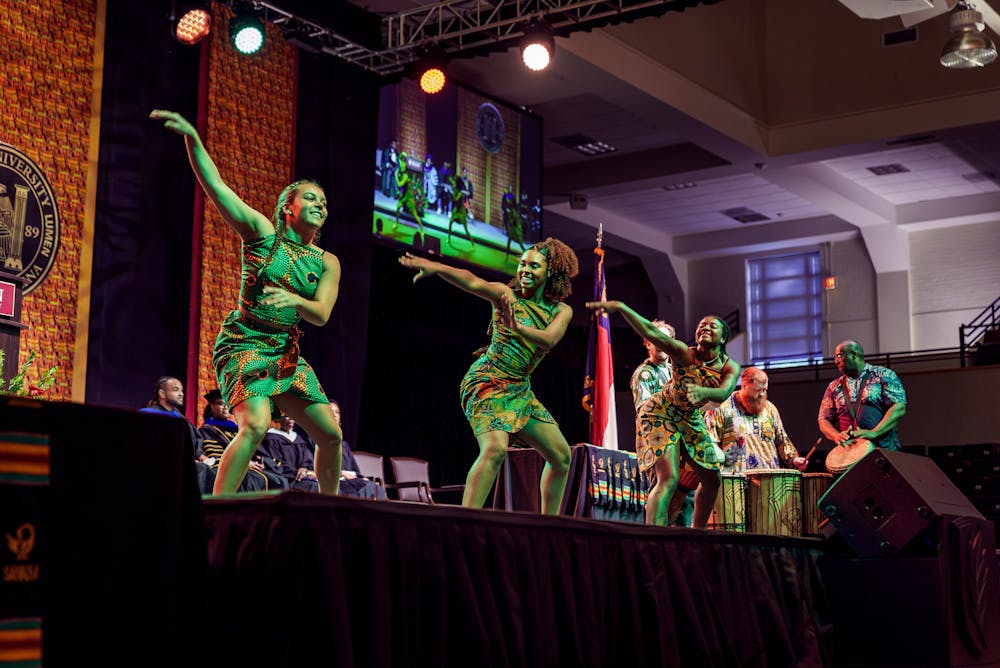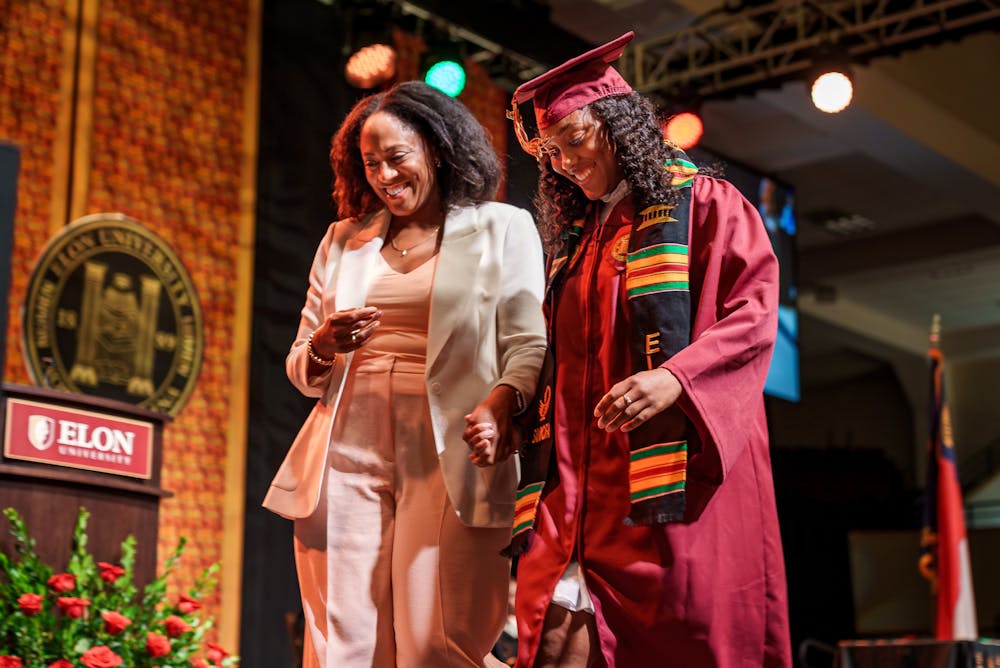Updated as of 10:37 p.m. on May 23 to include additional photos.
Scott Proudfit, professor of English, presented graduating senior Demya Culp with her stole made from kente cloth and proclaimed that she is the kind of person he wants her daughter to be.
“I would gratefully have taught you in 50 more,” Culp said. “ Yours is the face I seek out when I enter class. Now I’ll be saddened next year when I scan the room and no longer find it there.”
At Elon’s eighth annual Donning of the Kente cloth on May 23, faculty readers read statements written by the person selected by the graduate. The ceremony recognized two masters students and a number of graduating seniors, who are encouraged to wear their stoles to their commencement ceremony tomorrow.

Dancers perform to live African drums at the beginning of Donning of the Kente on May 23 in Alumni Gym.
Graduates had their stoles — made from the kente cloth — presented by a family member, friend or mentor. The cloth symbolizes prestige in many African societies and the stoles presented at the ceremony were handmade from Ghana, Randy Williams, vice president for inclusive excellence, said.
All of the graduates are their ancestors' wildest dreams, Williams said, recognizing that it is less than one week after the 70th anniversary of the Brown v. Board of Education Supreme Court decision — which outlawed segregation laws.
“The African philosophy of Ubuntu comes to mind,” Williams said. “I am, because we are. We are, because I am. Ubuntu.”
Family members, mentors and friends took a moment to recognize the graduates by presenting them with a stole, and in some cases singing and dancing, to show their pride. The ceremony also featured a group of drummers who welcomed the graduates into the ceremony — along with a group of dancers.
This year's graduation is unique as for many students in the class of 2024, their high school graduations were altered — or nonexistent — due to the COVID-19 pandemic, Buffie Longmire-Avital, professor of psychology, said. Longmire-Avital also said this ceremony is special to her, as her own children are graduating from fifth and eighth grade, respectively, this year. Longmire-Avital hopes the work of Elon’s graduating class serves to inspire her own children, she said.
Though filled with pride, Longmire-Avital also said when her children started kindergarten, she cried.
“I cried because as an alum of an American educational experience that has spanned both public and private institutions, as well as being a scholar of the hidden cost for what we Black students likely bear across all levels of our educational pursuits, I knew what you could face on your own journeys,” Longmire-Avital said.
Longmire-Avital compared the graduates to blackbirds, referencing the song by The Beatles. Paul McCartney wrote the lyrics to the song Blackbirds as an homage to the Little Rock Nine, commemorating the bravery of the first nine Black students who joined the previously segregated Arkansas High School.
“I know what you all have likely faced on the voyages to this moment, for we are blackbirds,” Longmire-Avital said. “We must take traditions, exchanges, spaces and even curriculums that were not ever meant for us, but repurpose, reconstruct and reclaim them all to travel on through the night, often as the only or one of very few.”
While after graduation, the path can be less clear, it is from trusting oneself and strength from others that one can find their way, Longmire-Avital said.
“You possess the resilient regeneration of a Phoenix,” Longmire-Avital said. “The light you seek out, the light you want to follow to your destination will never be found out there. It instead emanates from within you. It is a culmination of an ancestral flame that while terrifying to some it will not, it cannot be extinguished.”


